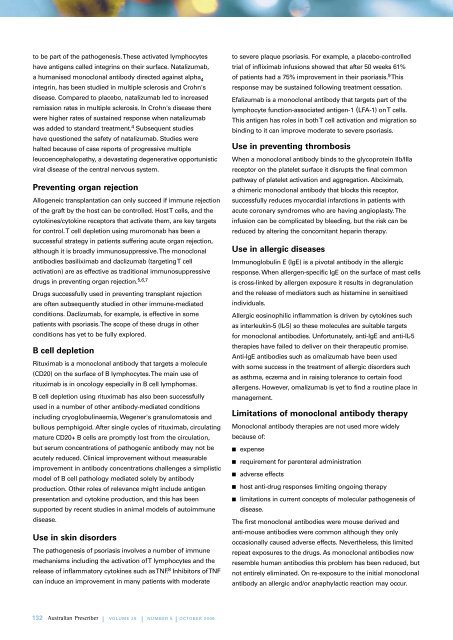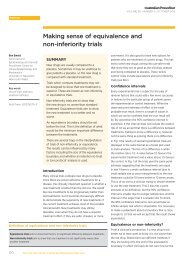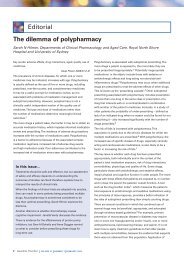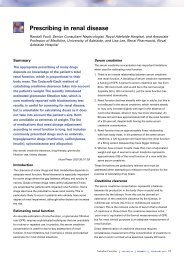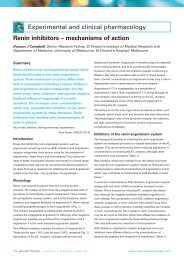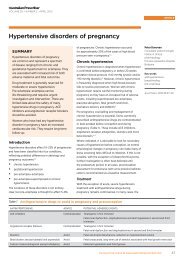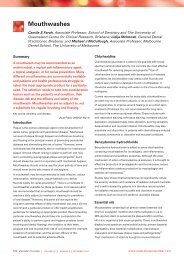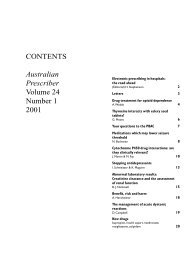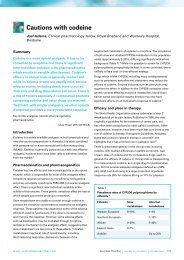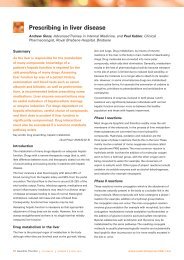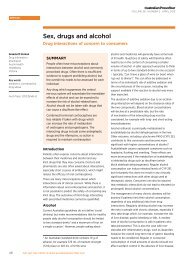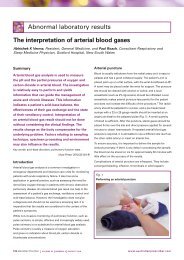download the full PDF issue - Australian Prescriber
download the full PDF issue - Australian Prescriber
download the full PDF issue - Australian Prescriber
You also want an ePaper? Increase the reach of your titles
YUMPU automatically turns print PDFs into web optimized ePapers that Google loves.
to be part of <strong>the</strong> pathogenesis. These activated lymphocytes<br />
have antigens called integrins on <strong>the</strong>ir surface. Natalizumab,<br />
a humanised monoclonal antibody directed against alpha4 integrin, has been studied in multiple sclerosis and Crohn's<br />
disease. Compared to placebo, natalizumab led to increased<br />
remission rates in multiple sclerosis. In Crohn's disease <strong>the</strong>re<br />
were higher rates of sustained response when natalizumab<br />
was added to standard treatment. 4 Subsequent studies<br />
have questioned <strong>the</strong> safety of natalizumab. Studies were<br />
halted because of case reports of progressive multiple<br />
leucoencephalopathy, a devastating degenerative opportunistic<br />
viral disease of <strong>the</strong> central nervous system.<br />
Preventing organ rejection<br />
Allogeneic transplantation can only succeed if immune rejection<br />
of <strong>the</strong> graft by <strong>the</strong> host can be controlled. Host T cells, and <strong>the</strong><br />
cytokines/cytokine receptors that activate <strong>the</strong>m, are key targets<br />
for control. T cell depletion using muromonab has been a<br />
successful strategy in patients suffering acute organ rejection,<br />
although it is broadly immunosuppressive. The monoclonal<br />
antibodies basiliximab and daclizumab (targeting T cell<br />
activation) are as effective as traditional immunosuppressive<br />
drugs in preventing organ rejection. 5,6,7<br />
Drugs success<strong>full</strong>y used in preventing transplant rejection<br />
are often subsequently studied in o<strong>the</strong>r immune-mediated<br />
conditions. Daclizumab, for example, is effective in some<br />
patients with psoriasis. The scope of <strong>the</strong>se drugs in o<strong>the</strong>r<br />
conditions has yet to be <strong>full</strong>y explored.<br />
B cell depletion<br />
Rituximab is a monoclonal antibody that targets a molecule<br />
(CD20) on <strong>the</strong> surface of B lymphocytes. The main use of<br />
rituximab is in oncology especially in B cell lymphomas.<br />
B cell depletion using rituximab has also been success<strong>full</strong>y<br />
used in a number of o<strong>the</strong>r antibody-mediated conditions<br />
including cryoglobulinaemia, Wegener's granulomatosis and<br />
bullous pemphigoid. After single cycles of rituximab, circulating<br />
mature CD20+ B cells are promptly lost from <strong>the</strong> circulation,<br />
but serum concentrations of pathogenic antibody may not be<br />
acutely reduced. Clinical improvement without measurable<br />
improvement in antibody concentrations challenges a simplistic<br />
model of B cell pathology mediated solely by antibody<br />
production. O<strong>the</strong>r roles of relevance might include antigen<br />
presentation and cytokine production, and this has been<br />
supported by recent studies in animal models of autoimmune<br />
disease.<br />
Use in skin disorders<br />
The pathogenesis of psoriasis involves a number of immune<br />
mechanisms including <strong>the</strong> activation of T lymphocytes and <strong>the</strong><br />
release of inflammatory cytokines such as TNF. 8 Inhibitors of TNF<br />
can induce an improvement in many patients with moderate<br />
132 | VOLUME 29 | NUMBER 5 | OCTOBER 2006<br />
to severe plaque psoriasis. For example, a placebo-controlled<br />
trial of infliximab infusions showed that after 50 weeks 61%<br />
of patients had a 75% improvement in <strong>the</strong>ir psoriasis. 9 This<br />
response may be sustained following treatment cessation.<br />
Efalizumab is a monoclonal antibody that targets part of <strong>the</strong><br />
lymphocyte function-associated antigen-1 (LFA-1) on T cells.<br />
This antigen has roles in both T cell activation and migration so<br />
binding to it can improve moderate to severe psoriasis.<br />
Use in preventing thrombosis<br />
When a monoclonal antibody binds to <strong>the</strong> glycoprotein IIb/IIIa<br />
receptor on <strong>the</strong> platelet surface it disrupts <strong>the</strong> final common<br />
pathway of platelet activation and aggregation. Abciximab,<br />
a chimeric monoclonal antibody that blocks this receptor,<br />
success<strong>full</strong>y reduces myocardial infarctions in patients with<br />
acute coronary syndromes who are having angioplasty. The<br />
infusion can be complicated by bleeding, but <strong>the</strong> risk can be<br />
reduced by altering <strong>the</strong> concomitant heparin <strong>the</strong>rapy.<br />
Use in allergic diseases<br />
Immunoglobulin E (IgE) is a pivotal antibody in <strong>the</strong> allergic<br />
response. When allergen-specific IgE on <strong>the</strong> surface of mast cells<br />
is cross-linked by allergen exposure it results in degranulation<br />
and <strong>the</strong> release of mediators such as histamine in sensitised<br />
individuals.<br />
Allergic eosinophilic inflammation is driven by cytokines such<br />
as interleukin-5 (IL-5) so <strong>the</strong>se molecules are suitable targets<br />
for monoclonal antibodies. Unfortunately, anti-IgE and anti-IL-5<br />
<strong>the</strong>rapies have failed to deliver on <strong>the</strong>ir <strong>the</strong>rapeutic promise.<br />
Anti-IgE antibodies such as omalizumab have been used<br />
with some success in <strong>the</strong> treatment of allergic disorders such<br />
as asthma, eczema and in raising tolerance to certain food<br />
allergens. However, omalizumab is yet to find a routine place in<br />
management.<br />
Limitations of monoclonal antibody <strong>the</strong>rapy<br />
Monoclonal antibody <strong>the</strong>rapies are not used more widely<br />
because of:<br />
■ expense<br />
■ requirement for parenteral administration<br />
■ adverse effects<br />
■ host anti-drug responses limiting ongoing <strong>the</strong>rapy<br />
■ limitations in current concepts of molecular pathogenesis of<br />
disease.<br />
The first monoclonal antibodies were mouse derived and<br />
anti-mouse antibodies were common although <strong>the</strong>y only<br />
occasionally caused adverse effects. Never<strong>the</strong>less, this limited<br />
repeat exposures to <strong>the</strong> drugs. As monoclonal antibodies now<br />
resemble human antibodies this problem has been reduced, but<br />
not entirely eliminated. On re-exposure to <strong>the</strong> initial monoclonal<br />
antibody an allergic and/or anaphylactic reaction may occur.


